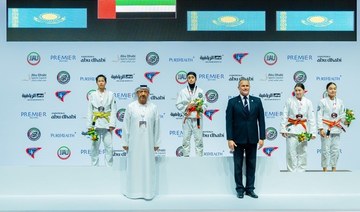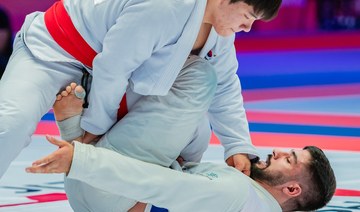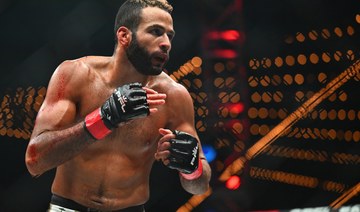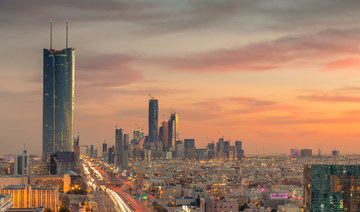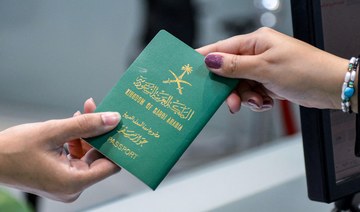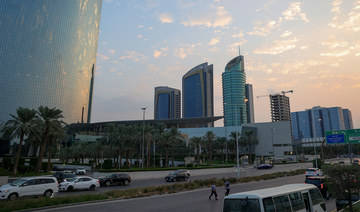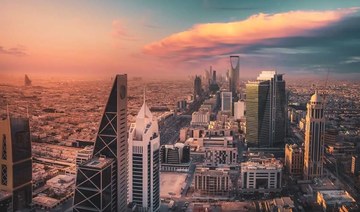AQABAT JABR: Israeli forces killed five Palestinian gunmen linked to the Islamic militant Hamas group in a raid on refugee camp in the occupied West Bank on Monday, the latest bloodshed in the region that will likely further exacerbate tensions.
The Palestinian president’s office called the violence a crime, urging the United States to pressure Israel to hold back on its incursions. The military said the raid was meant to apprehend a militant cell that staged a botched shooting attack on a restaurant in a Jewish settlement in the West Bank.
The violence comes amid one of the deadliest periods in years in the West Bank and in the first weeks of Israel’s new government, its most right-wing ever, which has promised to take a tough stance against the Palestinians.
The Israeli military said it was operating in the Aqabat Jabr refugee camp to apprehend the suspects behind a failed shooting attack last month at a West Bank restaurant, where attackers allegedly were thwarted by a weapon malfunction. The attackers then fled the scene, the military said, adding that they were members of the Hamas militant group that rules the Gaza Strip and has elements in the West Bank as well.
The military said it was searching Monday for the militant cell behind the shooting that it said had sealed itself inside a home in the refugee camp. During the search, troops encountered gunmen and a gunbattle erupted. The military said several of the gunmen who were killed were involved in the attempted attack on the restaurant.
“The new Israeli government is continuing its series of crimes against our Palestinian people,” a statement from Palestinian President Mahmoud Abbas’ office said.
Jihad Abu Al-Assal, the governor of Jericho and the Jordan Valley, said the military was still holding on to the gunmen’s bodies. Without access to the bodies, the Palestinian Health Ministry did not immediately confirm the deaths, saying only that three were injured, one of them critically.
Speaking at an event at the site of a recent deadly Palestinian shooting attack, Netanyahu confirmed earlier reports by Israeli security officials that five gunmen were killed.
Hamas said all five of those killed were members of its armed wing. Hamas spokesman Hazem Qassem said the violence would be met with a response.
“Our people and their resistance will not delay in responding to this crime,” he said.
The raid comes days after an earlier incursion in the Aqabat Jabr camp, which is near the Palestinian city of Jericho, a desert oasis in an area of the West Bank that rarely sees such unrest, where troops were also searching for the suspects.
Since the shooting at the nearby settlement, the Israeli military has blocked access to several roads into Jericho — a closure that has placed the city under a semi-blockade, disrupting business and creating hourslong bottlenecks at checkpoints that affected even Palestinian security forces, footage showed.
Monday’s violence comes days after an Israeli military raid on the Jenin refugee camp killed 10 Palestinians, mostly militants but also a 61-year-old woman. The next day, a Palestinian shooting attack outside an east Jerusalem synagogue killed seven people, including a 14-year-old.
The Israeli army has ramped up near-nightly raids in the occupied West Bank since a series of deadly Palestinian attacks within Israel last spring. Over the last year of escalating raids, Jericho has remained a sort of sleepy desert town, spared much of the violence.
The Palestinian Authority, in retaliation for last week’s raid into the Jenin refugee camp, declared a halt to security coordination with Israel.
Nearly 150 Palestinians were killed last year in the West Bank and east Jerusalem, making it the deadliest year in those areas since 2004, according to figures by the Israeli rights group B’Tselem. Since the start of this year, 41 Palestinians have been killed in those territories. Some 30 people were killed in Israel by Palestinians in 2022.
The Israeli army says most of the Palestinians killed have been militants. But stone-throwing youths protesting the incursions and others not involved in confrontations have also been killed.
Israel captured the West Bank, Gaza Strip and east Jerusalem in the 1967 Mideast war. The Palestinians seek those territories for their hoped-for independent.
Israeli troops kill 5 Palestinian gunmen in West Bank raid
https://arab.news/9bzya
Israeli troops kill 5 Palestinian gunmen in West Bank raid
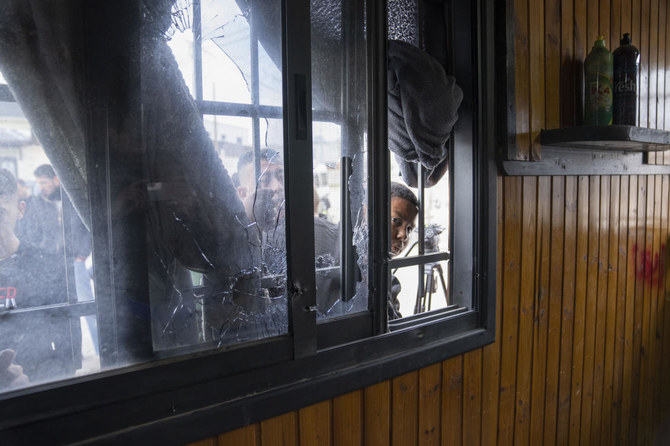
Hezbollah counts the cost of prolonged conflict with Israel in south Lebanon
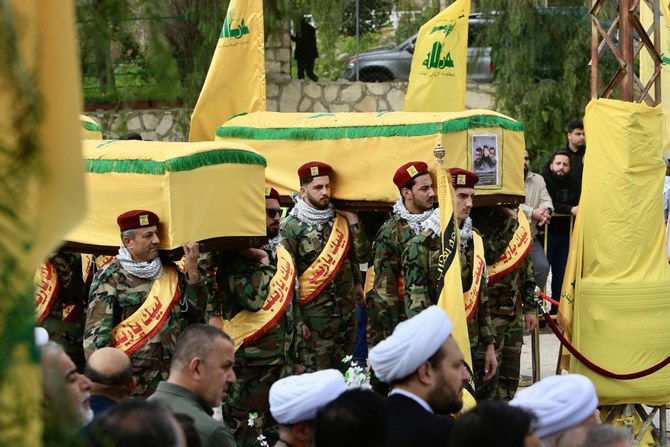
- Since hostilities began after Oct. 7, scores of Hezbollah fighters and commanders have been killed in Israeli strikes
- Observers say Hezbollah could lose support in south Lebanon over failure to protect and compensate civilians
BEIRUT: Israel claims its forces have eliminated half of Hezbollah’s commanders in southern Lebanon in a series of targeted strikes since the two sides began trading fire in the wake of the Oct. 7 Hamas-led attack on southern Israel.
Hezbollah has acknowledged it is “facing a war led by artificial intelligence,” with its secretary-general, Hassan Nasrallah, urging members near the border to avoid using cell phones and the internet, as these devices could be used to track targets.
“The Israelis take advantage of all modern technologies, social networking sites, and information warfare, carrying out new types of operations through systematic destruction and access to cadres and fighters who are influential to (Hezbollah’s) resistance,” Qassem Kassir, a political writer who specializes in Islamic movements, told Arab News.
While Hezbollah has no doubt lost a significant number of fighters and commanders since the outbreak of hostilities, it also has what analysts have called “a deep bench,” capable of fighting a full-scale war.
Given Hezbollah’s demographic advantage and its formidable local support base, analysts express skepticism about whether Israel can achieve its goal of pushing Hezbollah north of the Litani River in Lebanon.
“Today, Hezbollah is fighting a new battle, whether via direct confrontations, which is different from their traditional hit-and-run or guerrilla warfare tactics, or in terms of the quality of weapons and various capabilities that develop day after day,” said Kassir.
Nevertheless, Hezbollah’s ongoing war of attrition with Israel has produced an unexpected psychological, social, and military reality in southern Lebanon, which could cost it dearly if the conflict continues or escalates.
The majority of Lebanese deaths have been recorded on the southern front, with more than 438 noted by Lebanon’s Disaster Risk Management Unit. Most of these deaths are among military-aged males — fighters, rather than civilians.
According to a tally taken by the Associated Press, Israeli strikes have killed more than 350 people in Lebanon, most of them fighters with Hezbollah and allied groups, but also including more than 50 civilians.
Meanwhile, strikes by Hezbollah have killed at least 10 civilians and 12 soldiers in Israel, and have forced authorities to evacuate civilians away from the border, fearing a possible raid akin to Oct. 7.
Despite its losses, Hezbollah says it has used only a fraction of its capabilities against Israel, with the bulk of its arsenal of drones, missiles, and other advanced weapons supplied by Iran held in reserve should the conflict escalate.
Kassir believes recent Israeli wins have barely made a dent in Hezbollah’s combat machinery, and that the militia has sufficient means and manpower to continue fighting for the long haul.
“The Israeli talk about Hezbollah’s defeat is a kind of psychological warfare,” he said. “Hezbollah can continue fighting. It has so far used only 10 percent of its capabilities and is ready for any battle.”
While Hezbollah may be resilient enough to withstand current Israeli attacks, that says nothing of the communities along Lebanon’s southern border.
The daily exchange of fire has maimed and killed scores of civilians and caused significant damage to homes, businesses, farmland, and forests. Tens of thousands of residents have fled their towns and villages for the relative safety of the north.
Some analysts and observers believe support for Hezbollah could quickly wane if the civilian population continues to bear the brunt of these armed exchanges, or if the recent spate of setbacks undermines public confidence.
“There is no doubt that there has been a radical change in the perception of Hezbollah’s circumstances towards the power and deterrence that the party used to boast about,” Ali Al-Amin, editor of the Lebanese news site Janoubia, told Arab News.
Indeed, as the confidence the group once instilled in the Lebanese population after the 2006 war with Israel begins to dissipate, Al-Amin says Hezbollah may be losing its wider backing.
In particular, residents and business owners in the border regions, who previously built mansions and villas and invested heavily in tourism projects there, are now doubting Hezbollah’s promise to protect them and their assets.
“Hezbollah has not been able to protect this environment, and there is a rift between this environment and what is happening on the border,” said Al-Amin.
“In the villages where the displaced have taken refuge, there are questions such as: ‘Why did Israel manage to catch so many Hezbollah members and not the same in the Gaza Strip? Why were our homes destroyed and on the other side, the settlers’ homes are still standing and were not targeted by Hezbollah’s weapons, as is the case in the Lebanese Kafr Kila? Why does the enemy have so much accurate information about Hezbollah cadres and their movements and thus targets them?’”
Mindful of the reputational risks, Hezbollah has tried to stage-manage its image and conceal any perceived blunders.
“In the July 2006 war, there was a kind of contract between Nasrallah and his supporters which translated into blind trust in what he says,” said Al-Amin. “But, the scenes of destruction in the frontline villages are not allowed to be published in the media.
“This is because it would give the impression of an Israeli victory and that the rockets fired from Lebanon are for reconnaissance and not to harm, unlike Israel’s scorched-earth tactics for southern Lebanon.”
Nonetheless, the militia’s failings have not gone unnoticed.
“Hezbollah is facing a crisis due to the length of the conflict and its losses, and because of its security weaknesses, which enabled Israel to assassinate its field commanders and fight a war of attrition,” Harith Suleiman, an academic and political writer, told Arab News.
“The Israeli side did not incur high political, human and military costs.”
Thus far, there has been little in the way of international condemnation concerning Israeli strikes on southern Lebanon. Western diplomatic efforts have instead focused on Hezbollah’s demilitarization and demands for its separation from the conflict in Gaza.
Western diplomats, primarily led by France, have brought forward a series of proposals for a cessation of hostilities between Israel and Hezbollah.
Most of these hinge on Hezbollah moving its forces several kilometers from the border, a beefed-up Lebanese Army presence, and negotiations for Israeli forces to withdraw from disputed points along the border.
The eventual goal is the full implementation of UN Security Council Resolution 1701 that brought an end to the month-long war between Israel and Hezbollah in 2006 and that stipulated the full withdrawal of Israeli forces from Lebanon, their replacement by Lebanese and UNIFIL forces, and the disarmament of Hezbollah.
Hezbollah has signaled its willingness to entertain the proposals but has said there will be no deal in Lebanon before a ceasefire in Gaza. Israeli officials, meanwhile, have said a Gaza ceasefire does not automatically mean it will halt its strikes in Lebanon, even if Hezbollah does so.
“Hezbollah will accept the offered option to stop the confrontations in southern Lebanon and implement Resolution 1701,” said Suleiman.
However, Hezbollah’s acceptance of this agreement is contingent upon Israel’s acceptance of Egyptian-mediated deals with Israel, Suleiman added.
While life elsewhere in Lebanon continues as normal despite the armed exchanges in the south, discussions in the districts of Bint Jbeil, Tyre, and Nabatieh — just 5 km north of the border — are dominated by the question of who will compensate communities for their damaged homes, farms and businesses.
This uncertainty over compensation and how long the conflict will last has the potential to fuel resentment.
“Hezbollah is currently offering a displaced person whose house was destroyed $40,000, or he must wait for the end of the war for Hezbollah to rebuild his house,” said Al-Amin.
There is a lack of clarity, however, as to how equally this compensation will be distributed.
“Does Hezbollah, for example, reconstruct mansions, including what are considered architectural masterpieces that cost hundreds of thousands of dollars, at a different cost than ordinary houses destroyed by the bombing?” said Al-Amin.
“Does the average citizen accept this unfairness in compensation? This is one of the issues that awaits Hezbollah and causes a rift between it and its supporters.”
UAE adds 19 medals at Jiu-Jitsu Asian Youth Championship
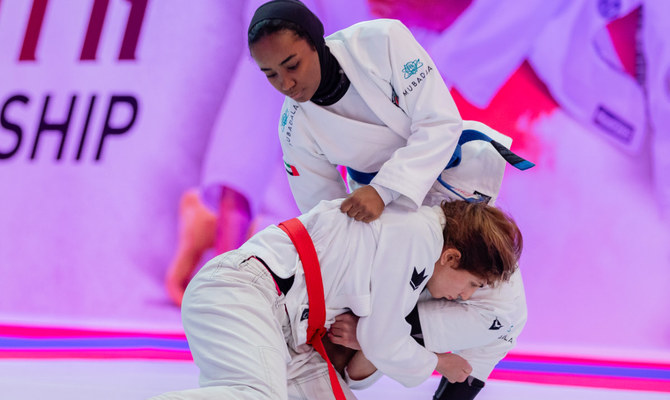
- Hosts won of five gold, two silver, and 12 bronze medals in the U-18 division at Mubadala Arena
ABU DHABI: Emirati athletes excelled on day two of the Jiu-Jitsu Asian Youth Championship, winning five gold medals and raising the UAE’s total medal count to 28.
In Tuesday’s U-18 division jiu-jitsu competition, the host nation’s athletes stood out on the mats, securing an impressive tally of five golds, two silvers, and 12 bronze medals.
Featuring competitions for athletes under 16, 18, and 21 years old, the ongoing Jiu-Jitsu Asian Youth Championship is part of the eighth Jiu-Jitsu Asian Championship held under the patronage of Sheikh Khaled bin Mohamed bin Zayed Al-Nahyan, crown prince of Abu Dhabi and chairman of the Abu Dhabi Executive Council, at Mubadala Arena from May 3-8.
The second day of the youth competitions witnessed action in various disciplines including duo-classic, show, jiu-jitsu, and jiu-jitsu fighting. The UAE Jiu-Jitsu National Team’s medals came in the jiu-jitsu discipline, the only category it is participating in.
Salem Alqubaisi (-56 Kg), Alanood Alharbi (-44kg), Abdulla Ahmed Aldarmaki (+85kg), and Zamzam Al-Hammadi (-57 kg) shone with gold medals for the hosts, while Shamsa Alameri (-48kg) and Khuloud Alblooshi (+70kg) bagged silver.
Haira Aldaheri (-40kg), Maitha Almezaini (-48kg), Mouza Alrashdi (-52kg), Saif Alblooshi (-44kg), Ebrahim Almansoori (+85kg), Mansoor Alblooshi (-48kg), Theyab Darmaki (-48kg), Obaid Saeed Alketbi (-52kg), Omar Younis Alraeesi (-52kg), Harib Alhammadi (-62kg), Ali Alteneiji (-77kg), and Majed Alshamsi (-85kg) took bronze.
“Despite their young age, our youth athletes demonstrated exceptional technical proficiency,” said Youssef Al-Batran, board member of the UAE Jiu-Jitsu Federation. “This accomplishment underscores the UAE Jiu-Jitsu Federation’s dedication to cultivating talent and creating a generation that proudly represents the UAE on the global stage.”
Khalifa Salem Andeez, the father of the athlete Ahmed Khalifa Andeez, was among the fans cheering for the under-18 athletes who took to the mats on Tuesday.
“I am here to encourage my son, who is participating in the 69 kg competition,” he said. “He performed well and reached the semi-finals. He couldn’t bag a gold medal today, but I am sure he will learn from his experience and perform better and aim for higher achievements.”
Salem Alqubaisi, the -56 kg gold winner, added: “There is no doubt that achieving the gold medal in the Jiu-Jitsu Asian Championship is a historic achievement for me that will keep me motivated to perform even better in the upcoming championships. I am extremely grateful to everyone who supported me in my journey towards the gold medal.”
Professional Fighters League signs talented UAE MMA duo

- Top Emirati prospects Hadi Al-Hussaini and Youssef Al-Housani will compete in Showcase bouts during the inaugural PFL MENA Season
- Combined roster of PFL and Bellator boasts 30 percent of its fighters independently world-ranked in the top 25 of their respective weight class
RIYADH: The Saudi-backed Professional Fighters League has announced the signing of two top MMA prospects from the UAE, flyweight Hadi Omar Al-Hussaini and featherweight Youssef Al-Housani to exclusive, multi-fight contracts.
The duo are expected to compete in Showcase bouts in the inaugural PFL MENA season, before joining next year’s season proper.
“We are thrilled to welcome two of the UAE’s top prospects to PFL MENA,” said Gustavo Firmino, vice president of fighter operations, PFL MENA. “The mission of the PFL is to find the best fighters in every region around the world. Our partnership with SRJ Sports has allowed the PFL to identify and sign exceptional fighters like Al-Hussaini and Al-Housani who we know have the potential to become global stars in the sport.”
Al-Hussaini joins PFL MENA with a 5-0-1 professional record. The former UAE Warriors standout trains at the world-renowned American Kickboxing Academy in San Jose, California under Javier Mendez, alongside world champions Islam Makhachev, Usman Nurmagomedov and Umar Nurmagomedov.
Youssef Al-Housani, meanwhile, joins PFL MENA with a 4-1 professional record. The Brazilian jiu-jitsu brown belt is an elite-level grappler with multiple Abu Dhabi jiu-jitsu pro championships to his name. Outside the cage, Al-Housani is an accomplished actor, appearing in the UAE-based TV show Ramadan.
PFL is the only organization in MMA with a sports-season format, where individual fighters compete in a regular season, playoffs, and championship each year. The combined roster of PFL and Bellator — purchased by PFL last year — boasts 30 percent of its fighters independently world-ranked in the top 25 of their respective weight class, the same percentage as UFC.
European Chamber of Commerce opens in Riyadh
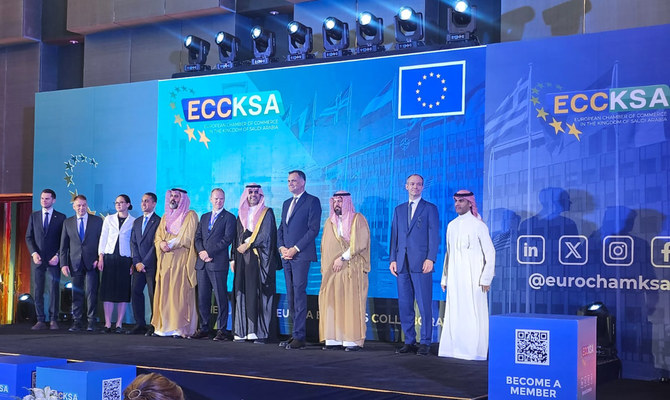
- ECCKSA to strengthen trade, investment, and economic cooperation
RIYADH: The European Chamber of Commerce in Saudi Arabia was inaugurated in Riyadh on Wednesday.
The launch event was attended by distinguished guests, including Ibrahim Al-Mubarak, assistant minister of investment; Luigi Di Maio, EU special representative for the Gulf; and Christophe Farnaud, the EU ambassador to Saudi Arabia, Oman, and Bahrain.
The chamber will serve as a platform to facilitate business cooperation, promote trade and investment, and support the alignment of regulatory frameworks, according to a press release from the EU.
In line with the strategic partnership between the EU and the Gulf Cooperation Council announced in May 2022, the establishment of the ECCKSA is a significant step in strengthening economic ties between the EU and the Kingdom.
Di Maio said that the establishment of the ECCKSA marks an important new chapter in the partnership between the EU and Saudi Arabia.
“I am convinced that this initiative will be key in bringing closer and in integrating our economies. The ECCKSA will certainly become a point of reference for European companies doing business in the Kingdom and Saudi companies looking for partners and markets in the EU.
"It will facilitate joint ventures and boost trade and investments. There is so much untapped potential and space to grow in our economic cooperation and I am confident that the next months and years will bring about more substantive and sustainable progress,” Di Maio added.
Al-Mubarak highlighted the integration of ECCKSA’s initiatives with Saudi Arabia’s Vision 2030, creating the potential for new business opportunities in non-oil sectors.
“The launch of the European Chamber of Commerce in Saudi Arabia marks a pivotal milestone in the flourishing economic partnership between the Kingdom and the EU. With foreign direct investment stock from Europe nearly doubling to SR218.5 billion ($58.26 billion) over the past five years, the establishment of ECCKSA will unlock new horizons for cross-border trade, investment, and collaboration.
“The chamber will be a catalyst for fostering stronger ties between our business communities and supporting Saudi Arabia’s economic diversification journey under Vision 2030,” he added.
The event also featured a panel discussion, titled “ECCKSA: Shaping the Future of EU-KSA Business Collaboration,” where experts discussed strategies for deepening economic ties and explored new opportunities for partnership.
The panel included Leon Delvaux, acting director at the EU; Lama Alghrair, director of investor intelligence at the Ministry of Investment; Thomas Juergensen, head of trade and economic affairs for Saudi Arabia, Bahrain, Oman, and Qatar; and Lorcan Tyrrell, ECCKSA chairman. They collectively outlined the anticipated impact of ECCKSA on the European and Saudi business communities.
Also at the launch, ECCKSA’s license was formally handed over by the Ministry of Investment in Saudi Arabia.
Kristijonas Gedvilas, CEO of ECCKSA, said that the chamber is dedicated not only to strengthening economic ties, but also to building a vibrant business ecosystem that supports the shared vision.
“Our immediate focus will be on expanding our membership, engaging businesses actively, and providing them with invaluable resources and opportunities that foster growth and innovation across both regions,” he added.
ECCKSA aims to advance initiatives that support its members while contributing to the economic prosperity of both regions.
Saudi Premium Residency Program hosts workshop in Riyadh
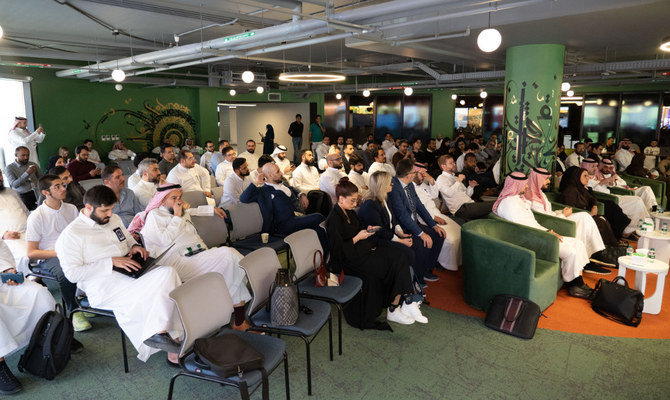
- The workshop also included networking and discussions on funding opportunities as well as mentorship
RIYADH: Saudi Arabia’s residency program attracting top foreign talent and investors hosted a workshop in Riyadh on Wednesday.
The Premium Residency Program, launched in 2019, draws skilled professionals, talented individuals and investors to the Kingdom through five residency categories.
It targets expatriates who wish to gain premium residency in Saudi Arabia.
The categories, announced in January, include special talent, gifted, entrepreneur, investor and real estate residencies.
The “Introduction to Premium Residency Products” at The Garage in Riyadh focused on the entrepreneur category.
The residency includes two sub-categories for entrepreneurs and innovators who contribute to the development of multiple industries in Saudi Arabia.
Category one of the entrepreneur residency provides a five-year premium residency. Applicants must obtain an entrepreneurial license from the Saudi Ministry of Investment and a letter of recommendation from the investing party.
They are required to obtain a minimum SR400,000 ($106,000) investment from a recognized organization and hold at least a 20 percent share of the startup.
After the five-year term, the entrepreneur residency will be renewed if the eligibility criteria is still met.
Category two grants a permanent residency only if the entrepreneur creates a minimum of 10 jobs in the first year and 10 or more in the second year.
The individual must demonstrate a minimum investment of SR15 million and a 10 percent ownership stake in the business.
The advantages of the entrepreneur residency include the ability to nominate two people from the applicant’s work team — such as executives — to obtain exceptional competence residencies.
Among the general benefits are owning and using real estate, issuing visit visas for relatives, and exemption from the financial fees imposed on expatriates and their companions.
Beneficiaries will be able to use the lanes designated for citizens and citizens of the Gulf Cooperation Council countries at ports across the Kingdom.
The holder of the premium residency and their family members can leave and return to Saudi Arabia without requiring a re-entry visa. They can also work in private sector establishments.
Sarah Al-Hamad, who attended the workshop, told Arab News: “I truly believe that the Premium Residency Program will drive economic growth and cultural exchange in the Kingdom for years to come.”
The workshop also included networking and discussions on funding opportunities as well as mentorship.



